Written Records, AWM54 741/5/9 PART 2 - [Patrols - Reconnaissance:] Report on Northern Territory Special Reconnaissance Unit, by Sqn Ldr D F Thomson RAAF [Report minus maps] - Part 10
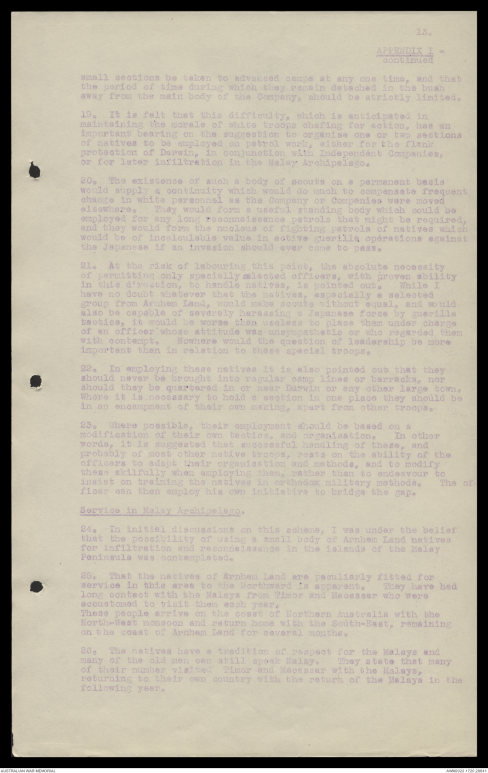
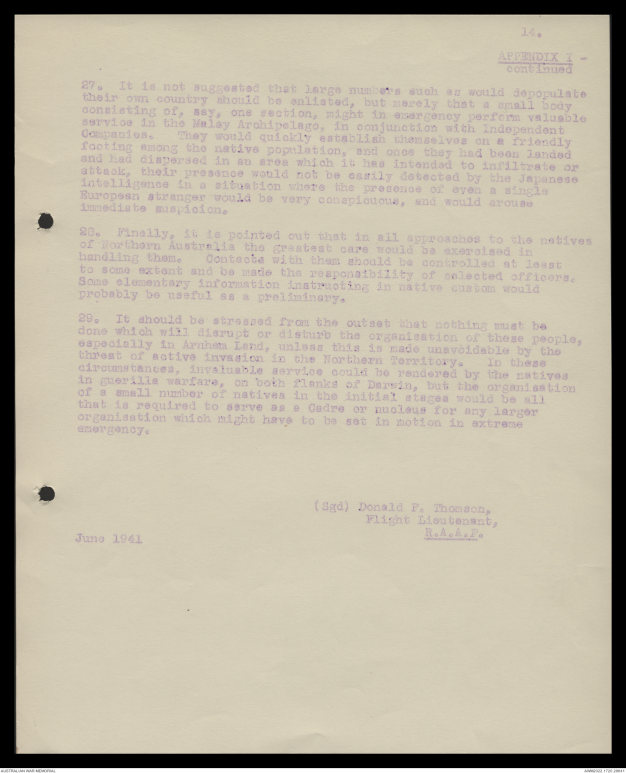
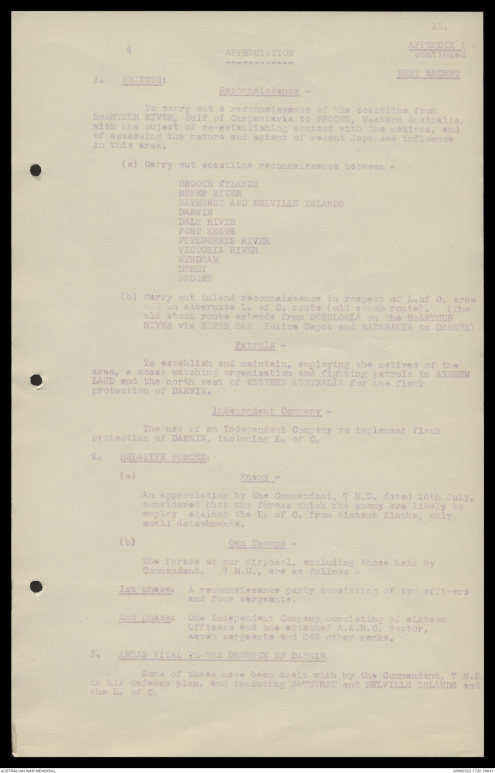
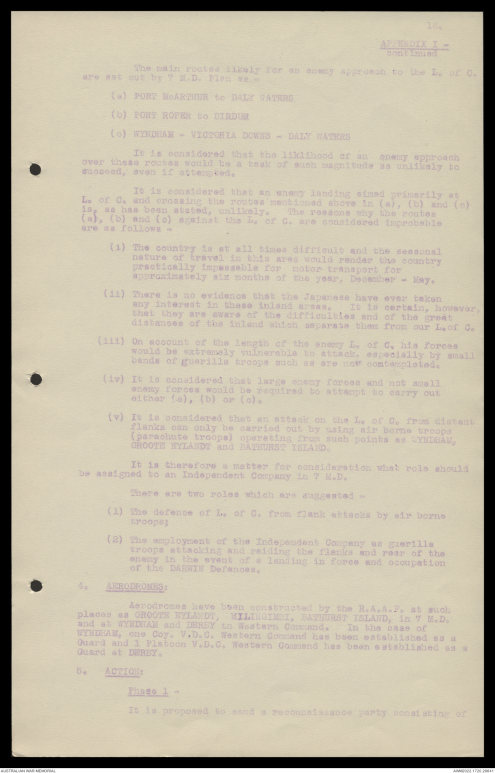
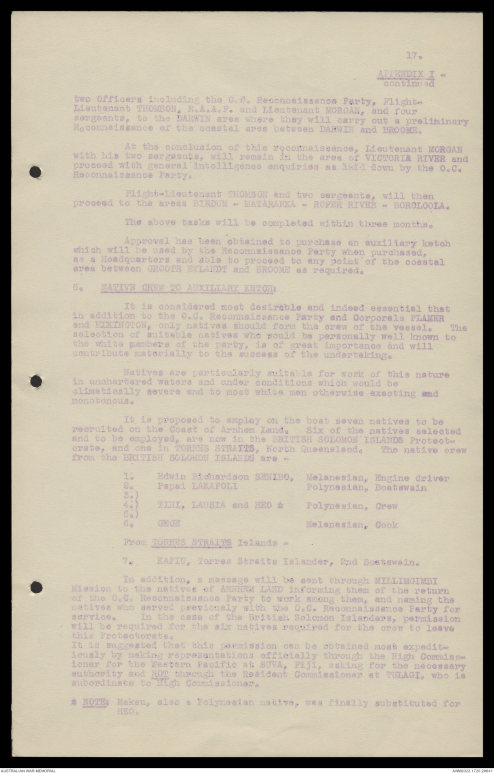
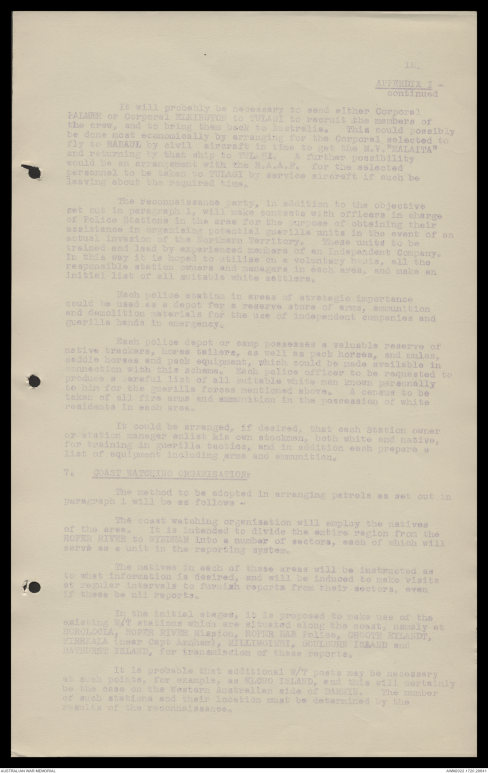
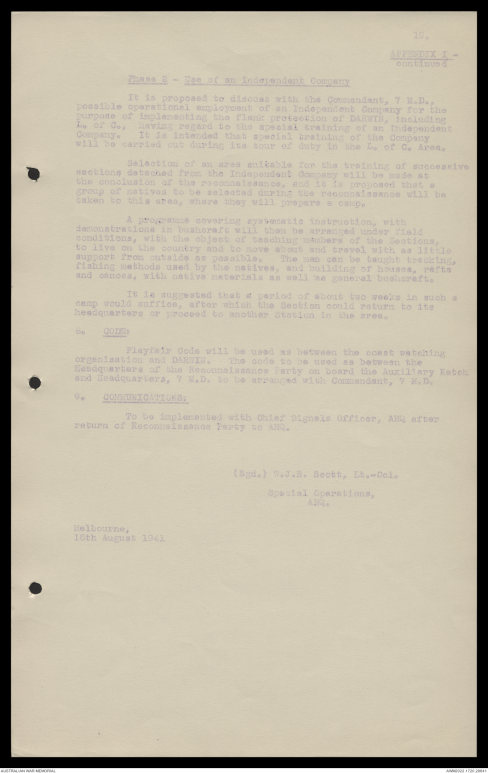
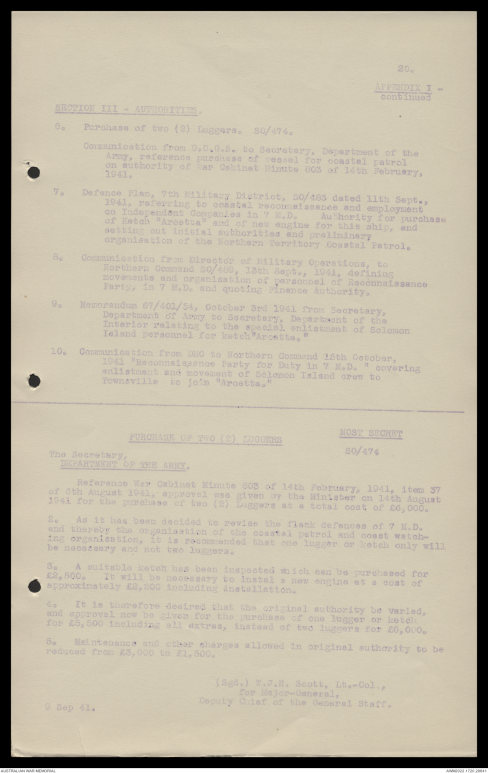
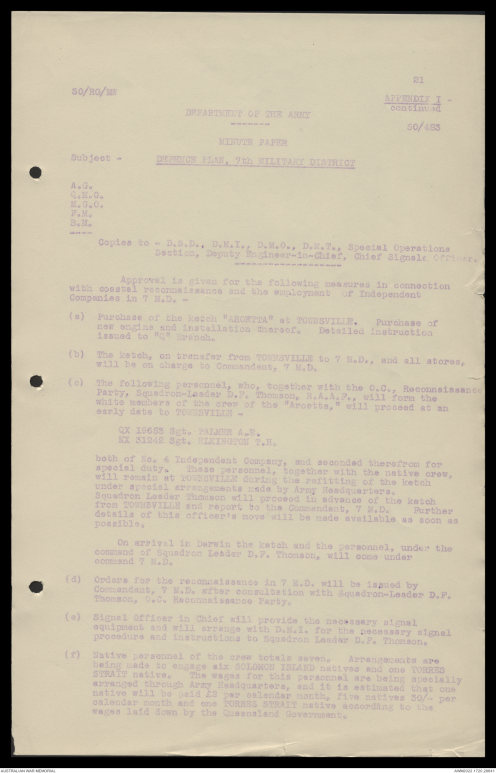
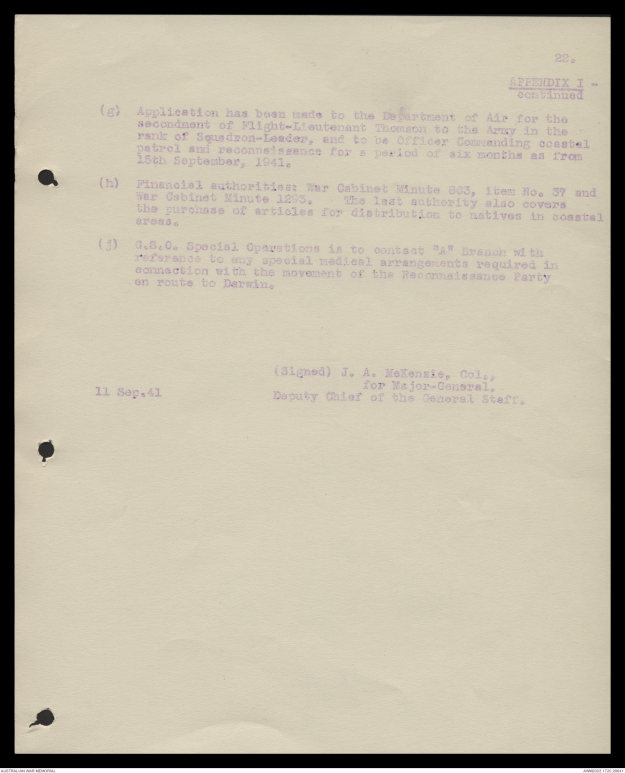
13.
APPENDIX I-
continued
small sections be taken to advanced camps at any one time, and that
the period of time during which they remain detached in the bush
away from the main body of the Company, should be strictly limited.
19. It is felt that this difficulty, which is anticipated in
maintaining the morale of white troops chafing for action, has an
important bearing on the suggestion to organise one or two sections
of natives to be employed on patrol work, either for the flank
protection of Darwin, in conjunction with Independent Companies,
or for later infiltration in the Malay Archipelago.
20. The existence of such a body of scouts on a permanent basis
would supply a continuity which would do much to compensate frequent
change in white personnel as the Company or Companies were moved
elsewhere. They would form a useful standing body which could be
employed for any long reconnaissance patrols that might be required,
and they would form the nucleus of fighting patrols of natives which
would be of incalculable value in active guerilla operations against
the Japanese if an invasion should ever come to pass.
21. At the risk of labouring this point, the absolute necessity
of permitting only specially selected officers, with proven ability
in this direction, to handle natives, is pointed out. While I
have no doubt whatever that the natives, especially a selected
group from Arnhem Land, would make scouts without equal, and would
also be capable of severely harassing a Japanese force by guerilla
tactics, it would be worse than useless to place them under charge
of an officer whose attitude was unsympathetic or who regarded them
with contempt. Nowhere would the question of leadership be more
important than in relation to these special troops.
22. In employing these natives it is also pointed out that they
should never be brought into regular camp lines or barracks, nor
should they be quartered in or near Darwin or any other large town.
Where it is necessary to hold a section in one place they should be
in an encampment of their own making, apart from other troops.
23. Where possible, their employment should be based on a
modification of their own tactics, and organisation. In other
words, it is suggested that successful handling of these, and
probably of most other native troops, rests on the ability of the
officers to adapt their organisation and methods, and to modify
these skilfully when employing them, rather than to endeavour to
insist on training the natives in orthodox military methods. The officer
can then employ his own initiative to bridge the gap.
Service in Malay Archipelago.
24. In initial discussions on this scheme, I was under the belief
that the possibility of using a small body of Arnhem Land natives
for infiltration and reconnaissance in the islands of the Malay
Peninsula was contemplated.
25. That the natives of Arnhem Land are peculiarly fitted for
service in this area to the Northward is apparent. They have had
long contact with the Malays from Timor and Macassar who were
accustomed to visit them each year.
These people arrive on the coast of Northern Australia with the
North-West monsoon and return home with the South-East, remaining
on the coast of Arnhem Land for several months.
25. The natives have a tradition of respect for the Malays and
many of the old men can still speak Malay. They state that many
of their number visited Timor and Macassar with the Malays,
returning to their own country with the return of the Malays in the
following year.
14.
APPENDIX I-
continued
27. It is not suggested that large numbers such as would depopulate
their own country should be enlisted, but merely that a small body
consisting of, say, one section, might in emergency perform valuable
service in the Malay Archipelago, in conjunction with Independent
Companies. They would quickly establish themselves on a friendly
footing among the native population, and once they had been landed
and had dispersed in an area which it has intended to infiltrate or
attack, their presence would not be easily detected by the Japanese
intelligence in a situation where the presence of even a single
European stranger would be very conspicuous, and would arouse
immediate suspicion.
28. Finally, it is pointed out that in all approaches to the natives
of Northern Australia the greatest care would be exercised in
handling them. Contacts with them should be controlled at least
to some extent and be made the responsibility of selected officers.
Some elementary information instructing in native custom would
probably be useful as a preliminary.
29. It should be stressed from the outset that nothing must be
done which will disrupt or disturb the organisation of these people,
especially in Arnhem Land, unless this is made unavoidable by the
threat of active invasion in the Northern Territory. In these
circumstances, invaluable service could be rendered by the natives
in guerilla warfare, on both flanks of Darwin, but the organisation
of a small number of natives in the initial stages would be all
that is required to serve as a Cadre or nucleus for any larger
organisation which might have to be set in motion in extreme
emergency.
(Sgd) Donald F. Thomson,
Flight Lieutenant,
R.A.A.F.
June 1941
15.
APPENDIX I -
continued
APPRECIATION
MOST SECRET
- OBJECTS:
Reconnaissance -
To carry out a reconnaissance of the coastline from
McARTHUR RIVER, Gulf of Carpentaria to BROOME, Western Australia,
with the object of re-establishing contact with the natives, and
of assessing the nature and extent of recent Japanese influence
in this area.
(a) Carry out coastline reconnaissance between -
GROOTE EYLANDT
ROPER RIVER
BATHURST AND MELVILLE ISLANDS
DARWIN
DALY RIVER
PORT KEATS
FITZMORRIS RIVER
VICTORIA RIVER
WYNDHAM
DERBY
BROOME
(b) Carry out inland reconnaissance in respect of L. of C. area
and in alternate L. of C. route (old stock route). (The
old stock route extends from BOROLOOLA on the McARTHUR
RIVER via ROPER BAR Police Depot and MATARANKA to DARWIN).
Patrols-
To establish and maintain, employing the natives of the
area, a coast watching organisation and fighting patrols in ARNHEM
LAND and the north west of WESTERN AUSTRALIA for the flank
protection of DARWIN.
Independent Company -
The use of an Independent Company to implement flank
protection of DARWIN, including L. of C.
2. RELATIVE FORCES:
(a) Enemy -
An appreciation by the Commandant, 7 M.D. dated 10th July,
considered that the forces which the enemy are likely to
employ against the L. of C. from distant flanks, only
small detachments.
(b) Own Troops -
The forces at our disposal, excluding those held by
Commandant, 7 M.D., are as follows -
1st phase: A reconnaissance party consisting of two officers
and four sergeants.
2nd phase: One Independent Company consisting of sixteen
Officers and one attached A.A.N.C. doctor,
seven sergeants and 249 other ranks.
3. AREAS VITAL TO THE DEFENCE OF DARWIN
Some of these have been dealt with by the Commandant, 7 M.D.
in his defence plan, and including BATHURST and MELVILLE ISLANDS and
the L. of C.
16.
APPENDIX I-
continued
The main routes likely for an enemy approach to the L. of C.
are set out by 7 M.D. Plan are: -
(a) PORT McARTHUR to DALY WATERS
(b) PORT ROPER to BIRDUM
(c) WYNDHAM - VICTORIA DOWNS - DALY WATERS
It is considered that the likelihood of an enemy approach
over these routes would be a task of such magnitude as unlikely to
succeed, even if attempted.
It is considered that an enemy landing aimed primarily at
L. of C. and crossing the routes mentioned above in (a), (b) and (c)
is, as has been stated, unlikely. The reasons why the routes
(a), (b) and (c) against the L. of C. are considered improbable
are as follows -
(i) The country is at all times difficult and the seasonal
nature of travel in this area would render the country
practically impassable for motor transport for
approximately six months of the year, December - May.
(ii) There is no evidence that the Japanese have ever taken
any interest in these inland areas. It is certain, however,
that they are aware of the difficulties and of the great
distances of the inland which separate them from our L. of C.
(iii) On account of the length of the enemy L. of C. his forces
would be extremely vulnerable in attack, especially by small
bands of guerilla troops such as are now contemplated.
(iv) It is considered that large enemy forces and not small
enemy forces would be required to attempt to carry out
either (a), (b) or (c).
(v) It is considered that an attack on the L. of C. from distant
flanks can only be carried out by using air borne troops
(parachute troops) operating from such points as WYNDHAM,
GROOTE EYLANDT and BATHURST ISLAND.
It is therefore a matter for consideration what role should
be assigned to an Independent Company in 7 M.D.
There are two roles which are suggested -
(1) The defence of L. of C. from flank attack by air borne
troops;
(2) The employment of the Independent Company as guerilla
troops attacking and raiding the flanks and rear of the
enemy in the event of a landing in force and occupation
of the DARWIN Defences.
4. AERODROMES:
Aerodromes have been constructed by the R.A.A.F. at such
places as GROOTE EYLANDT, MILINGIMBI, BATHURST ISLAND, in 7 M.D.
and at WYNDHAM and DERBY in Western Command. In the case of
WYNDHAM, one Coy. V.D.C. Western Command has been established as a
Guard and 1 Platoon V.D.C. Western Command has been established as a
Guard at DERBY.
5. ACTION:
Phase 1 -
It is proposed to send a reconnaissance party consisting of
17.
APPENDIX I-
continued
two Officers including the O.C. Reconnaissance Party, Flight-Lieutenant
THOMSON, R.A.A.F. and Lieutenant MORGAN, and four
sergeants, to the DARWIN area where they will carry out a preliminary
Reconnaissance of the coastal area between DARWIN and BROOME.
At the conclusion of this reconnaissance, Lieutenant MORGAN
with his two sergeants, will remain in the area of VICTORIA RIVER and
proceed with general intelligence enquiries as laid down by the O.C.
Reconnaissance Party.
Flight-Lieutenant THOMSON and two sergeants, will then
proceed to the areas BIRDUM - MATARANKA - ROPER RIVER - BOROLOOLA.
The above tasks will be completed within three months.
Approval has been obtained to purchase an auxiliary ketch
which will be used by the Reconnaissance Party when purchased,
as a Headquarters and able to proceed to any point of the coastal
area between GROOTE EYLANDT and BROOME as required.
6. NATIVE CREW TO AUXILIARY KETCH:
It is considered most desirable and indeed essential that
in addition to the O.C. Reconnaissance Party and Corporals PLAMER
and ELKINGTON, only natives should form the crew of the vessel. The
selection of suitable natives who would be personally well known to
the white members of the party, is of great importance and will
contribute materially to the success of the undertaking.
Natives are particularly suitable for work of this nature
in unchartered waters and under conditions which would be
climatically severe and to most white men otherwise exacting and
monotonous.
It is proposed to employ on the boat seven natives to be
recruited on the Coast of Arnhem Land. Six of the natives selected
and to be employed, are now in the BRITISH SOLOMON ISLANDS Protectorate,
and one in TORRES STRAITS, North Queensland. The native crew
from the BRITISH SOLOMON ISLANDS are -
1. Edwin Richardson SENIBO, Melanesian, Engine driver
2. Papai LAKAPOLI Polynesian, Boatswain
3.)
4.) TIHI, LAUSIA and HEO * Polynesian, Crew
5.)
6. GEOH Melanesian, Cook
From TORRES STRAITS Islands -
7. KAPIU, Torres Straits Islander, 2nd Boatswain.
In addition, a message will be sent through MILLINGIMBI
Mission to the natives of ARNHEM LAND informing them of the return
of the O.C. Reconnaissance Party to work among them, and naming the
natives who served previously with the O.C. Reconnaissance Party for
service. In the case of the British Solomon Islanders, permission
will be required for the six natives required for the crew to leave
this Protectorate.
It is suggested that this permission can be obtained most expeditiously
by making representations officially through the High Commissioner
for the Western Pacific at SUVA, FIJI, asking for the necessary
authority and NOT through the Resident Commissioner at TULAGI, who is
subordinate to High Commissioner.
* NOTE: Makeu, also a Polynesian native, was finally substituted for
HEO.
18.
APPENDIX I -
continued
It will probably be necessary to send either Corporal
PALMER or Corporal ELKINGTON to TULAGI to recruit the members of
the crew, and to bring them back to Australia. This could possibly
be done most economically by arranging for the Corporal selected to
fly to RABAUL by civil aircraft in time to get the M.V. "MALAITA"
and returning by that ship to TULAGI. A further possibility
would be an arrangement with the R.A.A.F. for the selected
personnel to be taken to TULAGI by service aircraft if such be
leaving about the required time.
The reconnaissance party, in addition to the objective
set out in paragraph 1, will make contacts with officers in charge
of Police Stations in the area for the purpose of obtaining their
assistance in organising potential guerilla units in the event of an
actual invasion of the Northern Territory. These units to be
trained and lead by experienced members of Independent Company.
In this way it is hoped to utilise on a voluntary basis, all the
responsible station owners and managers in each area, and make an
initial list of all suitable white settlers.
Each police station in areas of strategic importance
could be used as a depot for a reserve store of arms, ammunition
and demolition materials for the use of independent companies and
guerilla hands in emergency.
Each police depot or camp possesses a valuable reserve of
native trackers, horse tailers, as well as pack horses, and mules,
saddle horses and pack equipment, which could be made available in
connection with this scheme. Each police officer to be requested to
produce a careful list of all suitable white men known personally
to him for the guerilla forces mentioned above. A census to be
taken of all fire arms and ammunition in the possession of white
residents in each area.
It could be arranged, if desired, that each station owner
or station manager enlist his own stockman, both white and native,
for training in guerilla tactics, and in addition each prepare a
list of equipment including arms and ammunition.
7. COAST WATCHING ORGANISATION:
The method to be adopted in arranging patrols as set out in
paragraph 1 will be as follows -
The coast watching organisation will employ the natives
of the area. It is intended to divide the entire region from the
ROPER RIVER to WYNDHAM into a number of sectors, each of which will
serve as a unit in the reporting system.
The natives in each of these areas will be instructed as
to what information is desired, and will be induced to make visits
at regular intervals to furnish reports from their sectors, even
if these be nil reports.
In the initial stages, it is proposed to make use of the
existing W/T stations which are situated along the coast, mainly at
BOROLOOLA, ROPER RIVER Mission, ROPER BAR Police, GROOTE EYLANDT,
YIRRKALA (near Cape Arnhem), MILLINGIMBI, GOULBURN ISLAND and
BATHURST ISLAND, for translation of these reports.
It is probable that additional W/T posts may be necessary
at such points, for example, as ELCHO ISLAND, and this will certainly
be the case on the Western Australian side of DARWIN. The number
of such stations and their location must be determined by the
results of the reconnaissance.
19.
APPENDIX I -
continued
Phase 2 - Use of an Independent Company
It is proposed to discuss with the Commandant, 7 M.D.,
possible operational employment of an Independent Company for the
purpose of implementing the flank protection of DARWIN, including
L. of C., having regard to the special training of an Independent
Company. It is intended that special training of the Company
will be carried out during its tour of duty in the L. of C. Area.
Selection of an area suitable for the training of successive
sections detached from the Independent Company will be made at
the conclusion of this reconnaissance, and it is proposed that a
group of natives to be selected during the reconnaissance will be
taken to this area, where they will prepare a camp.
A programme covering systematic instruction, with
demonstrations in bushcraft will then be arranged under field
conditions, with the object of teaching members of the Sections,
to live on the country and to move about and travel with as little
support from outside as possible. The men can be taught tracking,
fishing methods used by the natives, and building of houses, rafts
and canoes, with native materials as well as general bushcraft.
It is suggested that a period of about two weeks in such a
camp would suffice, after which the Section could return to its
headquarters or proceed to another Station in the area.
8. CODE:
Playfair Code will be used as between the coast watching
organisation and DARWIN. The code to be used as between the
Headquarters of the Reconnaissance Party on board the Auxiliary Ketch
and Headquarters, 7 M.D. to be arranged with Commandant, 7 M.D.
9. COMMUNICATIONS:
To be implemented with Chief Signals Officer, AHQ after
return of Reconnaissance Party to AHQ.
(Sgd.) W.J.R. Scott, Lt.-Col.
Special Operations,
AHQ.
Melbourne,
16th August 1941
20.
APPENDIX I -
continued
SECTION III - AUTHORITIES.
6. Purchase of two (2) Luggers. S0/474.
Communication from D.C.G.S. to Secretary, Department of the
Army, reference purchases of vessel for coastal patrol
on authority of War Cabinet Minute 603 of 14th February,
1941.
7. Defence Plan, 7th Military District, S0/485 dated 11th Sept.,
1941, referring to coastal reconnaissance and employment
on Independent Companies in 7 M.D. Authority for purchase
of Ketch "Aroetta" and of new engine for this ship, and
setting out initial authorities and preliminary
organisation of the Northern Territory Coastal Patrol.
8. Communication from Director of Military Operations, to
Northern Command S0/460, 18th Sept., 1941, defining
movements and organisation of personnel of Reconnaissance
Party, in 7 M.D. and quoting Finance Authority.
9. Memorandum 67/401/54, October 3rd 1941 from Secretary,
Department of Army to Secretary, Department of the
Interior relating to the special enlistment of Solomon
Island personnel for ketch "Aroetta."
10. Communication from DHQ to Northern Command, 16th October,
1941 "Reconnaissance Party for Duty in 7 M.D." covering
enlistment crew to and movement of Solomon Island crew to
Townsville to join "Aroetta".
MOST SECRET
PURCHASE OF TWO (2) LUGGERS S0/474
The Secretary,
DEPARTMENT OF THE ARMY
Reference War Cabinet Minute 603 of 14th February, 1941, Item 37
of 6th August, 1941, approval was given by the Minister on 14th August
1941 for the purchase of two (2) Luggers at a total cost of £6,000.
2. As it has been decided to revise the flank defences of 7 M.D.
and thereby the organisation of the coastal patrol and coast watching
organisation, it is recommended that one lugger or ketch only will
be necessary and not two luggers.
3. A suitable ketch has been inspected which can be purchased for
£2,500. It will be necessary to install a new engine at a cost of
approximately £2,500 including installation.
4. It is therefore desired that the original authority be varied,
and approval now be given for the purchase of one lugger or ketch
for £5,500 including all extras, instead of two luggers for £6,000.
5. Maintenance and other charges allowed in original authority to be
reduced from £3,000 to £1,500.
(Sgd.) W.J.H. Scott, Lt.-Col.,
for Major-General,
Deputy Chief of the General Staff.
9 Sep 41.
21
S0/HQ/MN
APPENDIX I -
continued
DEPARTMENT OF THE ARMY
S0/483
MINUTE PAPER
Subject - DEFENCE PLAN. 7th MILITARY DISTRICT
A.G.
Q.M.G.
N.G.C.
F.M.
S.M.
Copies to - D.S.D., D.M.T., D.M.O., D.H.T., Special Operations
Section, Deputy Engineer-in-Chief, Chief Signals Officer.
Approval is given for the following measures in connection
with coastal reconnaissance and the employment of Independent
Companies in 7 M.D. -
(a) Purchase of the ketch "AROETTA" at TOWNSVILLE. Purchase of
new engine and installation thereof. Detailed instruction
issued to "Q" Branch.
(b) The ketch, on transfer from TOWNSVILLE TO 7 M.D. , and all stores,
will be on charge to Commandant, 7 M.D.
(c) The following personnel, who, together with the O.C., Reconnaissance
Party, Squadron-Leader D.F. Thomson, R.A.A.F., will form the
white members of the crew of the "Aroetta," will proceed at an
early date to TOWNSVILLE -
QX 19653 Sgt. PALMER A.B.
KX 31242 Sgt. ELKINGTON T.H.
both of No. 4 Independent Company, and seconded therefrom for
special duty. These personnel, together with the native crew
will remain at TOWNSVILLE during the refitting of the ketch
under special arrangements made by Army Headquarters.
Squadron Leader Thomson will proceed in advance of the ketch
from TOWNSVILLE and report to the Commandant, 7 M.D. Further
details of this officer's move will be made available as soon as
possible.
On arrival in Darwin the ketch and the personnel, under the
command of Squadron Leader D.F. Thomson, will come under
command 7 M.D.
(d) Orders for the reconnaissance in 7 M.D. will be issued by
Commandant 7 M.D. after consultation with Squadron-Leader D.F.
Thomson, O.C. Reconnaissance Party.
(e) Signal Officer in Chief will provide the necessary signal
equipment and will arrange with D.M.I. for the necessary signal
procedure and instructions to Squadron Leader D.F. Thomson.
(f) Native personnel of the crew totals seven. Arrangements are
being made to engage six SOLOMON ISLAND natives and one TORRES
STRAIT native. The wages for this personnel are being specially
arranged through Army Headquarters, and it is estimated that one
native will be paid £3 per calendar month, five natives 30/- per
calendar month and one TORRES STRAIT native according to the
wages laid down by the Queensland Government.
22.
APPENDIX I-
continued
(g) Application has been made to the Department of Air for the
secondment of Flight-Lieutenant Thomson to the Army in the
rank of Squadron-Leader, and to be Officer Commanding coastal
patrol and reconnaissance for a period of six months as from
15th September, 1941.
(h) Financial authorities: War Cabinet Minute 803, item No. 37 and
War Cabinet Minute 1293. The last authority also covers
the purchase of articles for distribution to natives in coastal
areas.
(i) G.S.O. Special Operations is to contact "A" Branch with
references to any special medical arrangements required in
connection with the movement of the Reconnaissance Party
en route to Darwin.
(Signed) J.A. McKenzie, Col.,
for Major-General.
Deputy Chief of the General Staff.
11 Sep, 41
 Deb Parkinson
Deb ParkinsonThis transcription item is now locked to you for editing. To release the lock either Save your changes or Cancel.
This lock will be automatically released after 60 minutes of inactivity.